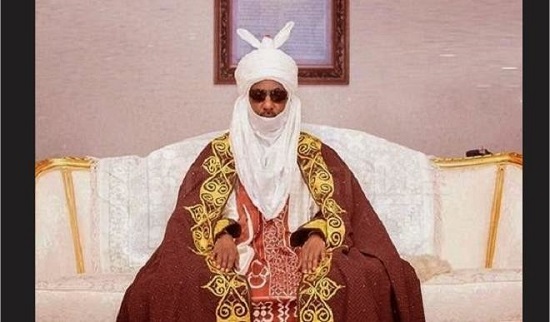By Ray Ekpu
It seemed to be a setting of stark contrasts and contradictions that did not have much chance from the get-go of ending differently from the way it ended on Monday March 9. Emir Muhammadu Sanusi II was a well known, well educated and well heeled public intellectual who carried the badge of a radical ideologue haughtily. Brilliant, uncompromising, cosmopolitan, urbane technocrat, Sanusi was not afraid to utilise his sharp tongue in demolishing traditional values, feudal practices and any and every practice that he considered to be antithetical to development in northern Nigeria specifically and Nigeria generally.
It would have served him and society better if he had chosen to be a non-resident reformer, unaffiliated, unaligned, totally on his own, employing himself as his man and delivering his homilies from time to time to the power elite and other decision makers without caring whose ox was gored.
As Governor of the Central Bank of Nigeria he exercised the powers of that office with reckless casualness donating billions of naira to a few universities of his partisan choice. Many people queried the fairness of his choices and the audacity of a Central Bank Governor dishing out such humongous monies without worrying about political and financial correctness. In 2014 he wrote a letter to President Goodluck Jonathan alleging that $49.8 billion which ought to have been in the Federation account was missing. The letter was leaked to the public either by him or by someone else and the dam broke. First, the leakage of the letter was an issue. Then the correctness or otherwise of the figure was another. As the uproar grew into a commotion Mr. Sanusi kept revising the figure downwards until it came to about $20 billion.
Then Emir Ado Bayero of Kano died. It seemed an opportune moment for Sanusi to bring to fruition his consuming passion to occupy the throne of his forefathers. Many reasonable people were puzzled by the desperate desire of this radical intellectual with an uncompromisingly high level of outspokenness to seek the conservative seat of the Emir of an ultra-conservative territory. Governor Rabiu Musa Kwankwaso decided against the temperamentally better suited Ado Bayero to give the throne to Sanusi. Kwankwaso had vied in the primaries of the APC wanting to be the party’s presidential flagbearer. Muhammadu Buhari defeated him. He returned to the PDP from whence he came. Dr. Abdullahi Ganduje of the APC won the Governorship election of the State and inherited Sanusi as the Emir of Kano.
There was no love lost between the two men. Some analysts think that Emir Sanusi in his utterances and behaviour was treating Governor Ganduje with undeserved condescencion. When the Governor spent 30 days in China to negotiate for a loan Emir Sanusi reportedly said that the Governor wanted to borrow money to do rail transportation for people to attend weddings in Kano. This remark did not go down well with Governor Ganduje. During last year’s Governorship election in Kano the Governor reportedly suspected that Emir Sanusi was supporting Kwankwaso’s man, Mallam Abba Yusuf of the PDP against him.
They have actually been addressed by many other Nigerians. Radical members of the political and intellectual elite from the north such as Balarabe Musa, Bala Usman, Aminu Kano and Bala Mohammed, to mention but a few, had at one time or another addressed these various issues as matters that ought to lead to a development paradigm shift in the north. The difference is that none of them was an Emir. Besides, their messages lacked the haughtiness and the stridency of Emir Sanusi’s message which seemed to be an unacceptably drastic put-down that was capable of bringing disharmony to the conservative feudal north. As an Emir, Mr. Sanusi was a public servant paid from the public purse of Kano State. He held his office at the pleasure of the Governor who invariably deserved to be given all the respect that is due to that office. But it does appear that Dr. Ganduje did not feel that he was suitably respected by the Emir and so decided to teach him who the boss was. So it was bound to be a brutal battle between royalty and radicalism. The two of them were likely to make strange bedfellows. Sanusi was an embodiment of both; was royalty likely to trump radicalism? Or radicalism was likely to be the winner? Really, radicalism has no place in a conservative institution like the monarchy.
He probably also thought that he would use the rigour of his rhetorics to bamboozle his boss into accepting his political, economic and social postulations as the path to a new era in Kano State. He misjudged on two grounds. One, he did not need the Emir’s job considering his ideological credentials. Two, if he thought he needed it he ought to have lowered his profile, toned down his radical postulations and serve humbly and conservatively as the office has always demanded. But I think he felt that he could change the Emirship institution rather than the institution changing him. He could not change the institution and the institution could not change him.
He lost. He was dethroned and then banished to some village he had never been to in Nasarawa State. Banishment is one of the anachronistic relics of our colonial and military era. It has no place, not even a remote place, in our constitutional democracy. Good a thing his rights as a bona fide citizen of Nigeria hitherto trampled upon have been restored by the law court. From now onwards he will no longer be living in bondage. He is free to campaign for renaissance in the north and Nigeria without any reservation but he has wounds to lick.



